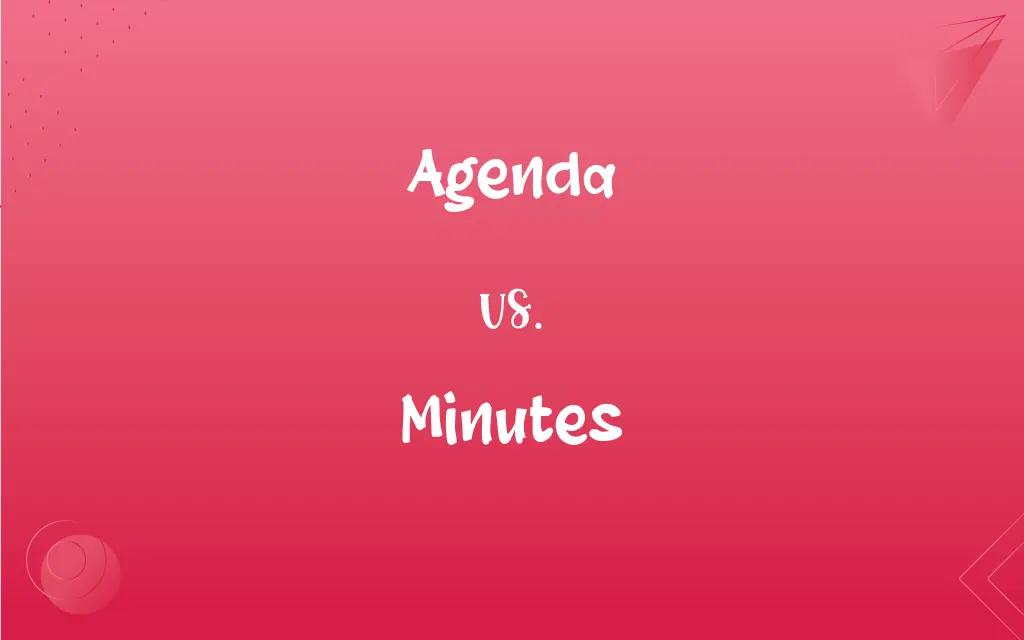Agenda vs. Minutes: What's the Difference?
Edited by Aimie Carlson || By Janet White || Published on February 18, 2024
An agenda is a list of items to be discussed in a meeting, while minutes are the official written record of what occurred during the meeting.

Key Differences
An agenda outlines topics and activities planned for a meeting, guiding the discussion. Minutes document the meeting's proceedings, decisions, and actions for record-keeping.
Agendas are prepared and distributed before a meeting to inform participants. Minutes are written during or after the meeting to capture its outcomes.
Agendas list topics, time allocations, and sometimes discussion goals. Minutes detail discussions, votes, decisions, and action items.
An agenda is used to organize and conduct a meeting efficiently. Minutes serve as an official record for reference and accountability.
Agendas are typically brief and bullet-pointed. Minutes are more detailed and narrative, often following a specific format.
ADVERTISEMENT
Comparison Chart
Purpose
To outline topics for discussion
To record what was discussed and decided
Timing of Creation
Created before the meeting
Compiled during or after the meeting
Level of Detail
General outline of topics
Detailed account of the meeting
Use
Guide for meeting conduct
Official record of proceedings
Format
Bullet points, list of items
Narrative, formal documentation
ADVERTISEMENT
Agenda and Minutes Definitions
Agenda
Objective Outline.
The board's agenda focused on strategic goals.
Minutes
Official Summary.
Minutes of the last meeting were read for approval.
Agenda
Meeting Plan.
The committee reviewed the agenda for tomorrow's meeting.
Minutes
Meeting Record.
She was responsible for taking the minutes during the meeting.
Agenda
List of Topics.
She added an item to the meeting's agenda.
Minutes
Document of Proceedings.
The minutes captured all key decisions made.
Agenda
Schedule of Activities.
The conference agenda is packed with interesting talks.
Minutes
Detailed Report.
He referenced the minutes to recall a specific discussion.
Agenda
Discussion Guide.
He distributed the agenda to all team members.
Minutes
Historical Account.
The club's minutes showed a long history of activities.
Agenda
A list of things to be discussed in a meeting.
Minutes
A unit of time equal to one sixtieth of an hour, or 60 seconds.
Minutes
A unit of angular measurement equal to one sixtieth of a degree, or 60 seconds. Also called arcminute, minute of arc.
Minutes
A measure of the distance one can cover in a minute
Lives ten minutes from school.
Minutes
A short interval of time; moment.
Minutes
A specific point in time
Stop that this minute!.
Minutes
A note or summary covering points to be remembered; a memorandum.
Minutes
Minutes An official record of the proceedings of a meeting.
Minutes
To record in a memorandum or the minutes of a meeting.
Minutes
Plural of minute
Minutes
The official notes kept during a meeting.
Minutes
A written account of what transpired at a meeting
FAQs
What is an agenda?
An outline of topics to be discussed in a meeting.
Are agendas distributed to all attendees?
Yes, typically before the meeting.
What are minutes?
A detailed record of what was discussed and decided in a meeting.
Who writes the minutes?
A designated minute-taker, often a secretary or administrative assistant.
Is an agenda legally binding?
No, it's a guide for the meeting, not a legal document.
Do minutes need approval?
Yes, minutes are usually approved in the next meeting for accuracy.
Should minutes be verbatim?
Not necessarily; they should capture the essence and decisions, not every word.
Who prepares the agenda?
Usually, the meeting's organizer or chairperson.
Can an agenda change during a meeting?
Yes, though major changes are usually avoided for clarity.
Can attendees request to add items to the agenda?
Yes, usually before the meeting or at the start.
How detailed should minutes be?
Detailed enough to accurately reflect decisions and key discussions.
How long after a meeting are minutes typically published?
It varies, but usually within a week to allow for accurate transcription and review.
What's the importance of an agenda in a meeting?
It helps keep the meeting focused, organized, and efficient.
How should minutes be stored for future reference?
In a secure and organized manner, often digitally for ease of access and preservation.
When are minutes typically shared?
After the meeting, once they're compiled and often after approval.
What happens if an item is not on the agenda?
It may be discussed if time allows, but often it's added to a future agenda.
Can agendas be reused for regular meetings?
Basic formats can be reused, but the content should be updated for each meeting.
Who has access to meeting minutes?
Typically, all attendees and sometimes other stakeholders, depending on the organization's policies.
Are minutes confidential?
It depends on the nature of the meeting and the organization's policy.
What should be avoided in an agenda?
Overloading it with too many items or being too vague about the topics.
About Author
Written by
Janet WhiteJanet White has been an esteemed writer and blogger for Difference Wiki. Holding a Master's degree in Science and Medical Journalism from the prestigious Boston University, she has consistently demonstrated her expertise and passion for her field. When she's not immersed in her work, Janet relishes her time exercising, delving into a good book, and cherishing moments with friends and family.
Edited by
Aimie CarlsonAimie Carlson, holding a master's degree in English literature, is a fervent English language enthusiast. She lends her writing talents to Difference Wiki, a prominent website that specializes in comparisons, offering readers insightful analyses that both captivate and inform.







































































